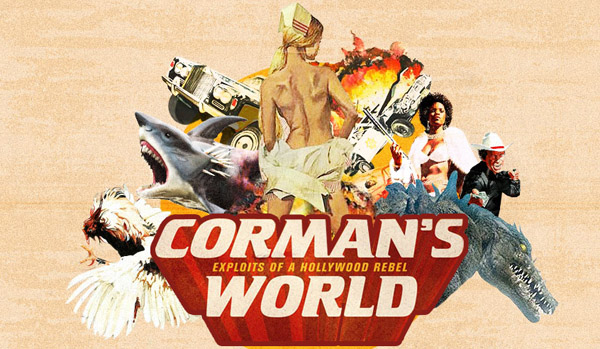Wednesday, August 15, 2012
Microreview [film]: Corman's World
The Meat
"Roger will just say exploitation pictures don't need plots. They need sensational things like girls shooting Filipinos out of trees. That works."
I wonder, do people still look down their nose at Roger Corman? For a long time, I'm sure they did, what with his making movies like Attack of the Crab Monsters, Ski Troop Attack, and Teenage Cave Man. But I would think that having launched the careers of Jack Nicholson, Francis Ford Coppola, Ron Howard, Peter Bogdanovich, and Peter Fonda, crafting arguably the most perfect expression of Vincent Price's horror legacy, and giving Boris Karloff a worthy send-off in a handful of films in the 1960s, Corman has earned the respect of fans across the entire spectrum of film-fandom.
But just in case he hasn't won somebody over yet, we have Corman's World: Exploits of a Hollywood Rebel, which is a full-tilt, unapologetic celebration of the man's work. From his early black-and-white sci-fi D-movies, through his late-50s/early-60s heyday as a producer/director, the radical shift in aesthetics, storytelling, and subject matter he helped spark and reinforce in the late-60s through the 1970s, and even up to his recent work for SyFy, this documentary hits all of the important points and does a nice job of putting everything in a larger context -- either in strictly Hollywood terms, or in broader social terms, where appropriate. It may not break any new ground in terms of how it presents the information (it's a very traditional, talking-heads-and-movie-clips approach), but there's a vibrancy and joy to the entire affair that more than makes up for any stylistic shortcomings.
What is perhaps the most appealing about this documentary, though, is the time spent with Roger Corman, himself. As he suggests (and is said about him) in the trailer, Roger may be a quiet, funny, erudite man of exceptional personal taste, but he has a roiling, tumultuous subconscious that has resulted in 60 years of notoriously un-classy movies. Roger's success means that, somewhere, and no matter how faint, there may be hope for Hollywood yet.
The Math
Objective Quality: 7/10
Bonuses: +1, for the scene where Jack Nicholson breaks down in tears talking about what Roger means to him; +1, for the fantastic array of interviewees.
Penalties: -1, for playing so safe in a documentary about such a subversive and non-traditional filmmaker (but this is a quibble).
Cult Movie Coefficient: 8/10. (for Corman fans like myself -- I'd go 7/10 if you're less enthusiastic about him)
[See explanation of our non-inflated scores here.]
